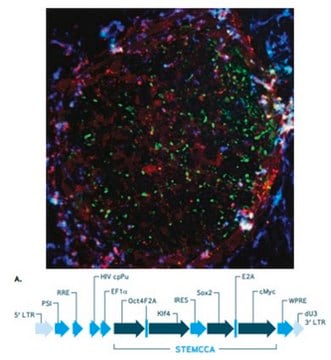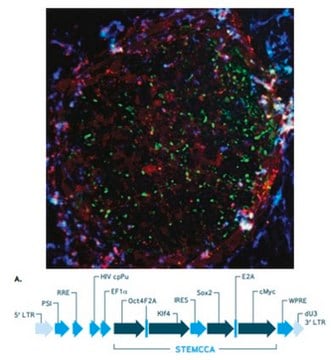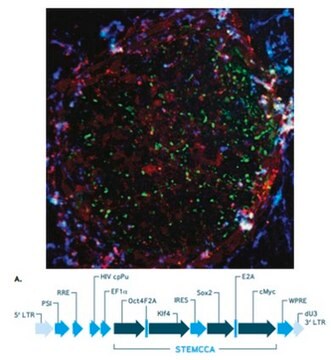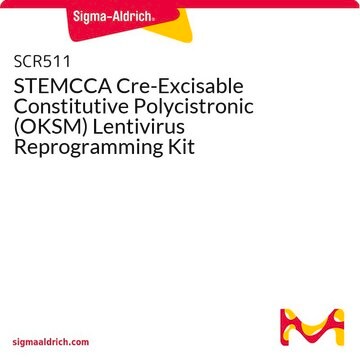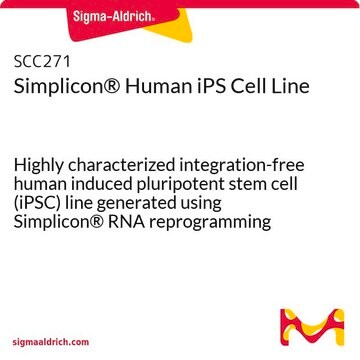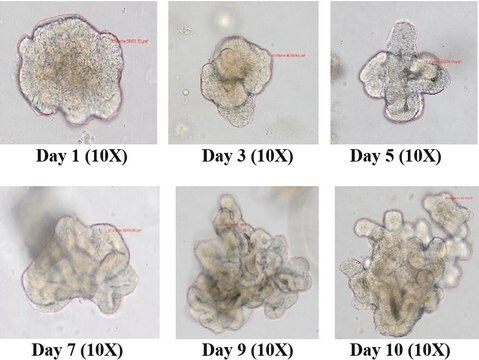SCR510
STEMCCA Constitutive Polycistronic (OKSM) Lentivirus Reprogramming Kit
The STEMCCA Constitutive Polycistronic Lentivirus Kit contains high titer polycistronic lentivirus & Polybrene transfection reagent that have been validated for the generation of mouse & human induced pluripotent stem cells.
About This Item
Productos recomendados
Quality Level
manufacturer/tradename
STEMCCA
technique(s)
cell culture | stem cell: suitable
input
sample type induced pluripotent stem cell(s)
sample type: mouse embryonic stem cell(s)
shipped in
dry ice
General description
Important note: the STEMCCA lentivirus reprogramming kits are provided in two formats, dependent on whether you are working with a human or mouse system. Human reprogramming experiments require a higher multiplicity of infection (MOI) than mouse experiments. Therefore, the larger, three-vial kits are required for human reprogramming experiments. If you are reprogramming mouse embryo fibroblast cells, you have the option to use either the one- or three-vial kit, depending on how many wells you want to infect. Reprogramming other rodent somatic cells may require more than one vial of lentivirus to perform at optimal MOI.
Application
Stem Cell Research
Components
2. Polybrene Transfection Reagent: (Part number TR-1003-50UL) One (1) vial containing 50 µL of 10 mg/mL stock.
Quality
Storage and Stability
Storage Class
12 - Non Combustible Liquids
flash_point_f
Not applicable
flash_point_c
Not applicable
Certificados de análisis (COA)
Busque Certificados de análisis (COA) introduciendo el número de lote del producto. Los números de lote se encuentran en la etiqueta del producto después de las palabras «Lot» o «Batch»
¿Ya tiene este producto?
Encuentre la documentación para los productos que ha comprado recientemente en la Biblioteca de documentos.
Protocolos
Stem cell reprogramming protocols to generate human induced pluripotent stem cells (iPSCs) including viral and non-viral RNA based methods.
Stem cell reprogramming protocols to generate human induced pluripotent stem cells (iPSCs) including viral and non-viral RNA based methods.
Stem cell reprogramming protocols to generate human induced pluripotent stem cells (iPSCs) including viral and non-viral RNA based methods.
Stem cell reprogramming protocols to generate human induced pluripotent stem cells (iPSCs) including viral and non-viral RNA based methods.
Nuestro equipo de científicos tiene experiencia en todas las áreas de investigación: Ciencias de la vida, Ciencia de los materiales, Síntesis química, Cromatografía, Analítica y muchas otras.
Póngase en contacto con el Servicio técnico